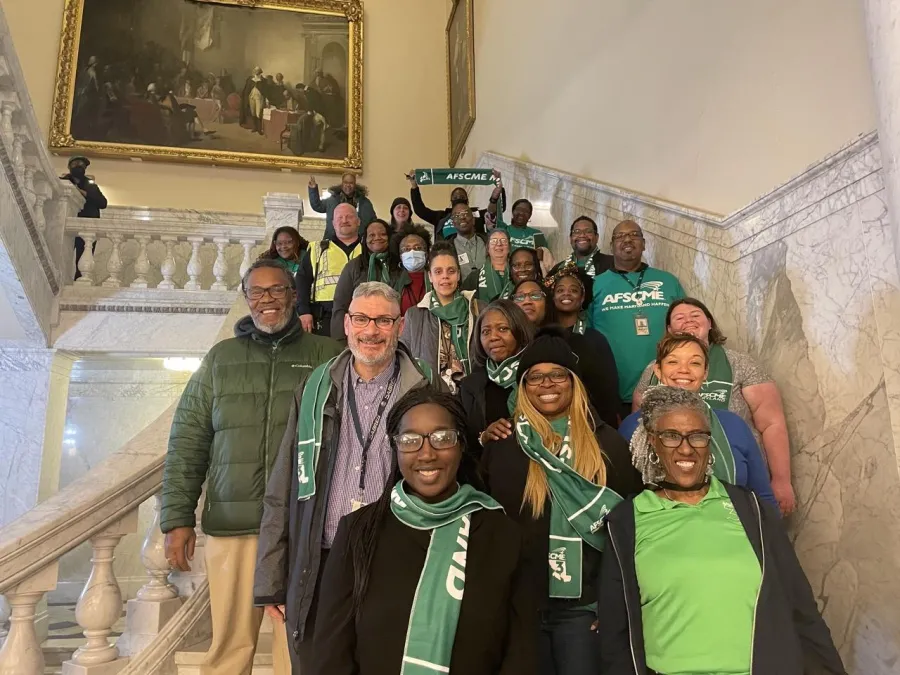What's Coming Up After Crossover: A Legislative Session Update

Monday, March 20 was "Crossover Day", the deadline for a bill to pass either the House or Senate to be considered by the other and have a chance of being signed into law.
We have had 5 bills successfully cross over:
- HB 368 (State Personnel - Executive Branch Service Contracts – Notification): This bill will ensure that our union gets notice when an agency attempts to outsource state services.This bill was amended and passed the House with a bipartisan vote of 105-30.
- HB 395/SB 223 (State Government – State Facilities Changes and Closures – Procedures): This bill standardizes the process agencies use to change or close a facility and ensures a plan for the employees before they do. Both bills passed their original chambers by unanimous vote.
- HB 184/SB 79 (State Personnel – Education and Transportation – Grievance Procedures): This bill allows MDOT and Higher Education workers to grieve for damages when their paychecks are incorrect. SB 79 passed the Senate with a vote of 46-0. HB 184 passed with a similarly overwhelming margin in the House of 131-6.
- SB 494 (Maryland State Department of Education - Employee Status and Designation): This bill converts eligible MSDE employees who were hired as “at-will” special employees to merit positions with full union rights in SPMS. This bill passed the Senate by unanimous vote and is now assigned to the Appropriations Committee.
- HB 116 (Trustees of the Walters Art Gallery - Collective Bargaining): This bill enables collective bargaining rights for workers at the Walters Art Museum in Baltimore. This bill passed the House with a bipartisan vote of 103-35.
As for the Public Employee Relations Act (HB 984/ SB 367) which would create a more effective labor board to better uphold Maryland's public sector labor laws, there's still a chance we can get this passed! House and Senate leadership have committed to continue considering this bill. With leadership's support, it is still possible to pass bills after the crossover deadline.
While the following bills did not cross over, we made progress on many of them and have put ourselves in a better position to get them passed in the future.
- HB 183/SB 298 (State Personnel - Collective Bargaining - Supervisory and Managerial Employees): This is a first-year bill that would enable collective bargaining rights for state workers in supervisory and managerial positions. When we bring the bill again next year, we will benefit from having legislators on the Appropriations and Finance committees being more familiar with it than they were this year. Shout out to AFSCME members who testified on this bill; your testimony was powerful and memorable!
- HB 380/SB 218 (Arbitration Reform for State Employees Act of 2023): We had more support this year for this bill than ever; this bill would provide for a neutral arbitrator to make a binding decision when parties reach impasse during state and higher education contract negotiations. This bill requires a constitutional referendum at the next general election (Nov. 2024), so we will come back with a big push in the next legislative session.
- HB 528/SB 421 (State Personnel - Teleworking Programs, Policies, and Guidelines – Requirements): This is also a first-year bill that we had truly great testimony on. While pushing this legislation, we have also been in informal discussions with the new administration about their stance on telework. We prefer a negotiated policy, so we look forward to continuing discussions with the administration and can bring this back next year if we are unable to reach agreement at the bargaining table.
- HB 900/SB 355 (Occupational Safety and Health - Public Buildings - Indoor AirQuality): This was another first-year bill with great testimony from our members and our friends at the Maryland State Education Association. As introduced, the bill had a very high fiscal note. We had some great amendments at the end to bring the fiscal note down, but we ran out of time. We’re in much better shape for next year if we decide to reintroduce this bill.
Lastly, thank you to all the AFSCME members who testified in budget hearings! Your testimony helped inform many of the required reports the legislature is working on. As of now, we're expecting our 2% COLA in July, step increase, and over 500 newly created positions from the FY24 budget from Governor Moore to be funded. We're continuing to push for more resources to rebuild our state government.
